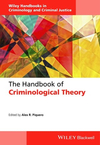Details

Piquero, Alex R. (Hrsg.)
The Handbook of Criminological Theory
Wiley-VCH
978-1-118-51238-8
1. Aufl. 2015 / 560 S.
Monographie/Dissertation
Kurzbeschreibung
Reihe: Wiley Handbooks in Criminology and Criminal Justice
An indispensable resource for all levels, this handbook provides up-to-date, in-depth summaries of the most important theories in criminology.
- Provides original, cutting-edge, and in-depth summaries of the most important theories in criminology
- Covers the origins and assumptions behind each theory, explores current debates and research, points out knowledge gaps, and offers directions for future research
- Encompasses theory, research, policy, and practice, with recommendations for further reading at the end of each essay
- Features discussions of broad issues and topics related to the field, such as the correlates of crime, testing theory, policy, and prediction
- Clearly and accessibly written by leading scholars in the field as well as up-and-coming scholars
Aus dem Inhalt
1. Introduction - Theory and Contemporary Criminology
Charles R. Tittle
2. Correlates of Crime
Matt DeLisi and Michael G. Vaughn
3. Theory Testing in Criminology
Travis C. Pratt
4. Deterrence
Tom Loughran, Ray Paternoster, and Douglas B. Weiss
5. Contemporary Biosocial Criminology: A Systematic Review of the Literature, 2000-2012
J.C. Barnes, Brian B. Boutwell, and Kevin M. Beaver
6. A Developmental Perspective on Adolescent Risk-Taking and Criminal Behavior
Elizabeth Cauffman, Caitlin Cavanagh, Sachiko Donley, and April Thomas
7. Social Disorganization Theory's Greatest Challenge: Linking Structural Characteristics to Crime in Socially Disorganized Communities
Charis E. Kubrin and James Wo
8. Routine Activities, Delinquency, and Youth Convergences
Jose R. Agustina and Marcus Felson
9. Environmental Criminology
Aiden Sidebottom and Richard Wortley
10. Control as an Explanation of Crime and Delinquency
Chester L. Britt and Michael Rocque
11. Strain, Economic Status, and Crime
Robert Agnew
12. Social Learning Theory
Ronald L. Akers and Wesley G. Jennings
13. Cultural Processes, Social Order, and Criminology
Mark T. Berg, Eric A. Sevell, and Eric A. Stewart
14. Labeling Theory: Past, Present, and Future
Ruth Triplett and Lindsey Upton
15. Feminist Theory
Joanne Belknap
16. Critical Criminology
Martin D. Schwartz and Henry H. Brownstein
17. Integrating Criminological Theories
Marv Krohn and Jeffery T. Ward
18. Developmental and Life-Course Theories of Crime
Tara R. McGee and David P. Farrington
19. Biosocial Bases of Antisocial and Criminal Behavior
Frances R. Chen, Yu Gao, Andrea Glenn, Sharon Niv, Jill Portnoy, Robert Schug, Yaling
Yang, and Adrian Raine
20. From Theory to Policy and Back Again
Scott H. Decker
21. How Do Criminologists Interpret Statistical Explanation of Crime? A Review of Quantitative Modeling in Published Studies
David Weisburd, Breanne Cave, and Alex R. Piquero
22. Situational Theory: The Importance of Interactions and Action Mechanisms in the Explanation of Crime
Per-Olof H. Wikström and Kyle Treiber
23. Macro-Level Theory: A Critical Component of Criminological Exploration
Eric P. Baumer and Ashley N. Arnio
24. What International Research Has Told Us About Criminological Theory
Olena Antonaccio and Ekaterina V. Botchkovar
25. Qualitative Criminology's Contributions of Theory
Andy Hochstetler and Heith Copes
